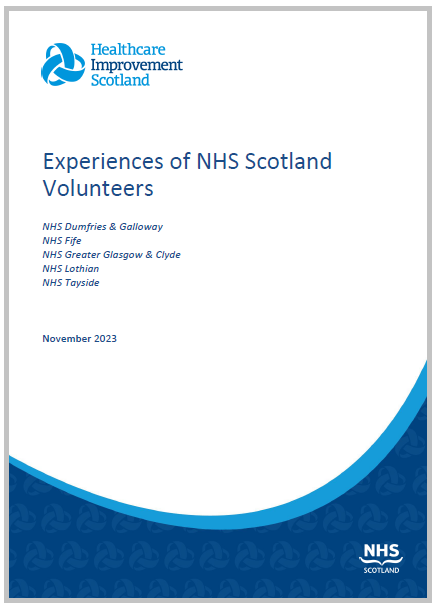Experiences of NHS Scotland Volunteers
In early 2023, volunteer managers from NHS Fife, NHS Lothian, NHS Tayside, NHS Greater Glasgow & Clyde and NHS Dumfries and Galloway worked together on a pilot of a national volunteer experience survey, supported by the NHS Scotland Volunteering Programme Team.
The purpose of the survey was to take a consistent approach to gathering data on volunteer’s experiences of volunteering within their NHS board, and to then use the data gathered to create a local improvement plan.
By taking this approach it also allowed for the entire data set to be analysed at a national level against the Volunteering for All: National Outcomes Framework principles and over time will help us to evidence the impact of volunteering, to identify improvements and to celebrate good practice.
The questions in Section 1 of the survey were developed using the six principles contained within Volunteering for All: National Outcomes Framework. A total of 1557 volunteers were invited to participate in the survey. 30% of volunteers (n=460) chose to participate in the survey and 100% of participants provided responses to all 19 statements in section 1.
Principle 1: Flexible and responsive
Recent published research in volunteering suggests that the way in which people want to volunteer is changing and there is a need for volunteer roles to be flexible, to be easy to access and to be able to fit in around people’s busy lives.
91% of volunteers who responded to the survey feel able to adjust their level of commitment or change their role, 95% feel able to give their time on their own terms and 96% know how to change / pause or stop volunteering. This demonstrates a good level of flexibility in volunteering within the NHS boards who participated in the survey.
Principle 2: Enabled and supported
99% of volunteers who responded to the survey enjoy taking part in volunteering and 97% knew who to ask for help if needed and understand how to carry out their role. This indicates that volunteers within the NHS boards who participated are very satisfied with their volunteering experience and feel well supported to carry out their roles. While still positive a lower proportion of volunteers reported being satisfied with practical help in terms of access, training and expenses (86%) which would benefit from further exploration to identify and implement improvements.
Principle 3: Sociable and connected
97% volunteers who responded to the survey enjoy the experience of volunteering and feel part of something, indicating a feeling of connection to the organisation. A slightly lower proportion 88% of volunteers feel that they have opportunities to meet up and spend time with others and 89% feel that that they are volunteering with or for common goals. This would merit further consideration in conjunction with the comments by some volunteers in section 2, which suggests that volunteers would value the opportunity to learn from each other, socialise and develop connections.
Principle 4: Valued and appreciated
When volunteers feel valued and appreciated they are more likely to stay with an organisation for longer. 95% of volunteers feel valued for what they bring and that their contributions are appreciated, while a slightly lower proportion of 90% said they can see how they make a difference. NHS boards are therefore encouraged to consider how they can provide feedback to volunteers which demonstrates the difference that they make.
Principle 5: Recognises diversity
This principle seeks to ensure that volunteers from a wide range of backgrounds, with a wide range of skills and experiences are supported to become involved in volunteering. 93% of volunteers who responded to the survey always feel involved and that their knowledge, skills and experiences are respected and utilised, while 91% of volunteers do not feel excluded because of who they are. However, through this survey we do not have any information on the demographics of the volunteers who responded and it is essential in future to gather and analyse equalities monitoring data as part of the volunteer experience survey.
Principle 6: Meaningful and purposeful
When volunteering is meaningful and purposeful for the volunteer it contributes to feelings of satisfaction and supports volunteer retention. 93% of volunteers who responded to the survey feel that what they do is worthwhile, 92% felt that their volunteering makes a difference and 91% that they are contributing to something that is important to them (91%).

